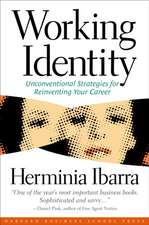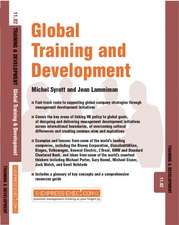The Palgrave Handbook of Research Design in Business and Management
Editat de K. Strangen Limba Engleză Hardback – 5 mar 2015
| Toate formatele și edițiile | Preț | Express |
|---|---|---|
| Paperback (1) | 959.04 lei 6-8 săpt. | |
| Palgrave Macmillan US – 19 noi 2015 | 959.04 lei 6-8 săpt. | |
| Hardback (1) | 963.15 lei 6-8 săpt. | |
| Palgrave Macmillan US – 5 mar 2015 | 963.15 lei 6-8 săpt. |
Preț: 963.15 lei
Preț vechi: 1174.58 lei
-18% Nou
Puncte Express: 1445
Preț estimativ în valută:
184.32€ • 200.15$ • 154.83£
184.32€ • 200.15$ • 154.83£
Carte tipărită la comandă
Livrare economică 22 aprilie-06 mai
Preluare comenzi: 021 569.72.76
Specificații
ISBN-13: 9781137379924
ISBN-10: 1137379928
Pagini: 565
Ilustrații: XXXVI, 601 p.
Dimensiuni: 152 x 229 x 38 mm
Greutate: 0.95 kg
Ediția:2015
Editura: Palgrave Macmillan US
Colecția Palgrave Macmillan
Locul publicării:New York, United States
ISBN-10: 1137379928
Pagini: 565
Ilustrații: XXXVI, 601 p.
Dimensiuni: 152 x 229 x 38 mm
Greutate: 0.95 kg
Ediția:2015
Editura: Palgrave Macmillan US
Colecția Palgrave Macmillan
Locul publicării:New York, United States
Cuprins
Preliminary Material i. Foreword: Vision and Reality; Joseph F. Hair, Jr ii. Preface: What's Unique for Practitioners; Kenneth D. Strang Research Design Guidelines 1. Why Practitioner-Scholars Need a Research Design Typology; Kenneth D. Strang 2. Articulating a Research Design Ideology; Kenneth D. Strang 3. Developing a Goal-Driven Research Strategy; Kenneth D. Strang 4. Matching Research Method with Ideology and Strategy; Kenneth D. Strang 5. Selecting Research Techniques for a Method and Strategy; Kenneth D. Strang 6. Design Issues in Cross-Cultural Research: Suggestions for Researchers; Linda Brennan, Lukus Parker, Dang Nguyen, Torgeir Aleti 7. Establishing Rationale and Significance of Research; Judith Hahn 8. Organizing and Conducting Scholarly Literature Reviews; Linnaya Graf 9. Interpreting Findings and Discussing Implications for all Ideologies; Mary Ann Rafoth, George Semich, Richard Fuller Positivist Applications 10. Implications of Experimental Versus Quasi-Experimental Designs; Jeremy W. Grabbe 11. Structural Equation Modeling: Principles, Processes, and Practices; Sewon Kim, Edward Sturman, Eun Sook Kim 12. Correlation to Logistic Regression Illustrated with a Victimization-Sexual Orientation Study; Creaig A. Dunton, Mark Beaulieu 13. Survey Method versus Longitudinal Surveys and Observation for Data Collection; John F. Gaski 14. Cross-Sectional Survey and Correspondence Analysis of Financial Manager Behavior; Kenneth D. Strang 15. Control Variables: ProblematicIssues and Best Practices; Leon Schjoedt, Krittaya Sangboon 16. Monte-Carlo Simulation Using Excel: Case Study in Financial Forecasting; Seifedine Kadry Pragmativist Applications 17. Critical Analysis using Four Case Studies Across Industries; Linnaya Graf 18. Integrating Multiple Case Studies with a Merger and Acquisition Example; Lars Schweizer 19. Iterative-Pragmatic Case Study Method and Comparisons with other Case Study Method Ideologies; Harm-Jan Steenhuis 20. Action Research Applied with Two Single Case Studies; Angeline Lim, Dae Seok-Chai 21. Transportation Queue Action Research at an Australian Titanium Dioxide Mining Refinery; Kenneth D. Strang 22. Participant Observation as Ethnography or Ethnography as Participant Observation in Organizational Research; Peter Sandiford Constructivist Applications 23. Constructivist Grounded Theory Applied to a Culture Study; Narasimha R.Vajjhala 24. Phenomenology Variations from Traditional Approaches to Eidetic and Hermeneutic Applications; Jillian McCarthy 25. Hermeneutic and Eidetic Phenomenology Applied to a Clinical Healthcare Study; Jillian McCarthy 26. Structure of a Dissertation for a Participatory Phenomenology Design; Judith Hahn 27. Emancipatory Phenomenology Applied to a Child Sex Offender Study; Rodney Alexander Final Generalizations and Descriptive Characteristics 28. Gaps to Address in Future Research Design Practices; Kenneth D. Strang, Linda Brennan, Narasimha R.Vajjhala, Judith Hahn 29. Contributor Biographies
Notă biografică
Angeline Lim, Organisation Solutions, SingaporeCreaig Dunton, State University of New York College at Plattsburgh, USADae Seok Chai, Texas A&M University, USADang Nguyen, RMIT University Vietnam, VietnamEdward Sturman, State University of New York Plattsburgh, USAEun Sook Kim, University of South Florida, USAGeorge Samich, Robert Morris University, USAHarm-Jan Steenhuis, Eastern Washington University, USAJeremy Grabbe, State University of New York Plattsburgh, USAJillian McCarthy, The University of Manchester, United KingdomJohn F. Gaski, University of Notre Dame, USAJude, State Social Service Department, USAKenneth David Strang, State University of New York, Plattsburgh at Queensbury, USAKrittaya Sangboon, Mahasarakham University, ThailandLars Schweizer, Goethe University Frankfurt, GermanyLeon Schjoedt, Indiana University South Bend, USALinda Brennan, RMIT, AustraliaLinnaya Graf, Liberty University Online, USALukas Parker, RMIT University Vietnam, VietnamMark Beaulieu, State University of New York College at Plattsburgh, USAMary Ann Rafoth, Robert Morris University, USANarasimha Rao Vajjhala, University of New York Tirana, AlbaniaPeter John Sandiford, University of Adelaide Business School, AustraliaRichard Fuller, Robert Morris University, USARodney Alexander, Department of Defense, USASeifedine Kadry, American University of the Middle East, KuwaitSewon Kim, State University of New York Empire State, USATorgeir Aleti, Victoria University, Australia








